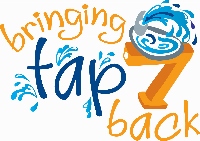
The Bringing Tap Back Project
BTB encourages Tennesseans to drink water instead of sugar-sweetened beverages in order to fight Tennessee’s obesity and diabetes epidemic.
With a grant from the TN Department of Health, the Tennessee Clean Water Network (TCWN) is helping Tennesseans make healthy choices in cities across the state. We are improving access to our safe, healthy, and free public drinking water while launching targeted educational campaigns to promote drinking water instead of sugar-sweetened beverages.
Why we do what we do:
Tennessee has the fifth-highest rate of diabetes in the US(1), and the US has the highest diabetes rate in the developed world.(2)
Sugar-sweetened beverages are the single largest caloric contributor to diabetes.(3)
Drinking just one twelve-ounce sugar-sweetened beverage a day increases the risk of developing diabetes by 22%.(4) A child’s risk for obesity increases an average of 60% with every additional daily serving of soda.(5)
If you were to drink one can of sugar-sweetened beverage every day—and not cut back on calories elsewhere—you could gain up to 15 pounds in a year.(6)
Modest but persistent reductions in calories (approximately one can of sugar-sweetened beverage per day) could halt the obesity epidemic for 90% or more of the population.(7)
Where we work:
In the schools, we will install water bottle refill stations, provide reusable water bottles, and prepare an engaging and innovative curriculum to promote the benefits of drinking water.
In the universities, we are partnering with the offices of sustainability to improve access to drinking water, and we will support student-generated campaigns to promote their use
For the general public, we are working with organizations and municipalities to install new water bottle refill stations with drinking fountains in the parks and public spaces. We are developing a mobile app to locate nearby drinking fountains and report upon their conditions. Finally, we will host six artist-designed water bottle refill station competitions in prominent public places across the state in order to improve access to drinking water while raising awareness.
How you can help:
Help spread the word and watch the project’s progress. Like us on FACEBOOK, follow us on TWITTER and INSTAGRAM.
Try a 30 day challenge, where you replace one Coke a day with a glass of water! Email Kimberly what you found!
Would you or your business like to donate water bottles to your local school? Contact Kimberly to learn how!
Do you have an event that focuses on sustainable communities and would like BTB to table? Contact Kimberly Pettigrew, our Director of Community Health:

*This project is funded under an agreement with the state of Tennessee.
Preliminary findings from gathered questionnaires can be found in this REPORT.
1. CDC Diabetes Report Card 2012. HTTP://WWW.CDC.GOV/DIABETES/PUBS/PDF/DIABETESREPORTCARD.PDF
2. WHO Diabetes Action Now booklet HTTP://WWW.WHO.INT/DIABETES/ACTIONNOW/EN/DANBOOKLET.PDF
3. Wang YC, Bleich SN, Gortmaker SL. Increasing caloric contribution from sugar-sweetened beverages and 100% fruit juices among US children and adolescents, 1988–2004. Pediatrics 2008;121(6):e1604–14.
4. Consumption of Sweet Beverages and Type 2 Diabetes incidence in European Adults DIABETOLOGIA. 2013 Jul;56(7):1520-30. doi: 10.1007/s00125-013-2899-8. Epub 2013 Apr 26.
5. Ludwig DS, Peterson KE, Gortmaker SL. Relation between consumption of sugar-sweetened drinks and childhood obesity: a prospective, observational analysis. LANCET. 2001;357:505-8.
6. Sugary Drinks or Diet Drinks: What’s the Best Choice? Harvard School of Public Health HTTP://WWW.HSPH.HARVARD.EDU/NUTRITIONSOURCE/SUGARY-VS-DIET-DRINKS/
7. Hill JO, Wyatt HR, Reed GW, Peters JC. Obesity and the environment: where do we go from here? Science 2003;299(5608):853–5.